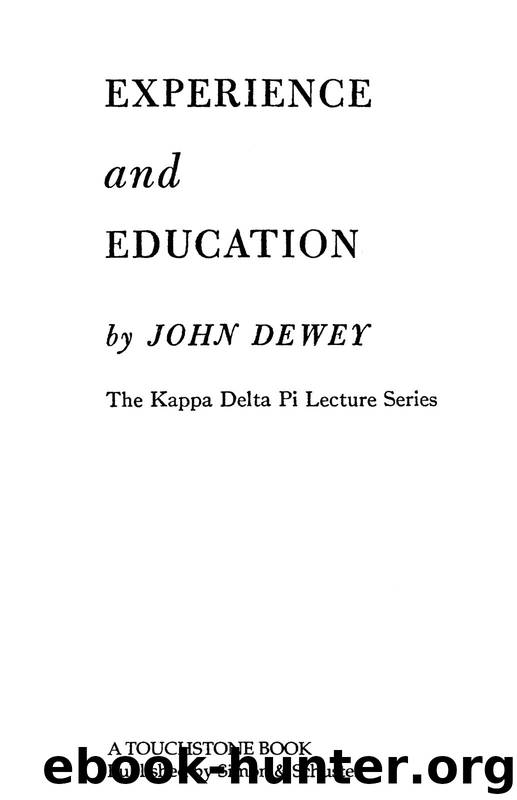Experience And Education (Kappa Delta Pi Lecture) by John Dewey

Author:John Dewey [Dewey, John]
Language: eng
Format: azw3
Publisher: Free Press
Published: 2007-11-01T04:00:00+00:00
Social Control
I HAVE said that educational plans and projects, seeing education in terms of life-experience, are thereby committed to framing and adopting an intelligent theory or, if you please, philosophy of experience. Otherwise they are at the mercy of every intellectual breeze that happens to blow. I have tried to illustrate the need for such a theory by calling attention to two principles which are fundamental in the constitution of experience: the principles of interaction and of continuity. If, then, I am asked why I have spent so much time on expounding a rather abstract philosophy, it is because practical attempts to develop schools based upon the idea that education is found in life-experience are bound to exhibit inconsistencies and confusions unless they are guided by some conception of what experience is, and what marks off educative experience from non-educative and mis-educative experience. I now come to a group of actual educational questions the discussion of which will, I hope, provide topics and material that are more concrete than the discussion up to this point.
The two principles of continuity and interaction as criteria of the value of experience are so intimately connected that it is not easy to tell just what special educational problem to take up first. Even the convenient division into problems of subject-matter or studies and of methods of teaching and learning is likely to fail us in selection and organization of topics to discuss. Consequently, the beginning and sequence of topics is somewhat arbitrary. I shall commence, however, with the old question of individual freedom and social control and pass on to the questions that grow naturally out of it.
It is often well in considering educational problems to get a start by temporarily ignoring the school and thinking of other human situations. I take it that no one would deny that the ordinary good citizen is as a matter of fact subject to a great deal of social control and that a considerable part of this control is not felt to involve restriction of personal freedom. Even the theoretical anarchist, whose philosophy commits him to the idea that state or government control is an unmitigated evil, believes that with abolition of the political state other forms of social control would operate: indeed, his opposition to governmental regulation springs from his belief that other and to him more normal modes of control would operate with abolition of the state.
Without taking up this extreme position, let us note some examples of social control that operate in everyday life, and then look for the principle underlying them. Let us begin with the young people themselves. Children at recess or after school play games, from tag and one-old-cat to baseball and football. The games involve rules, and these rules order their conduct. The games do not go on haphazardly or by a succession of improvisations. Without rules there is no game. If disputes arise there is an umpire to appeal to, or discussion and a kind of arbitration are means to a decision; otherwise the game is broken up and comes to an end.
Download
This site does not store any files on its server. We only index and link to content provided by other sites. Please contact the content providers to delete copyright contents if any and email us, we'll remove relevant links or contents immediately.
The Art of Coaching Workbook by Elena Aguilar(51156)
Trainspotting by Irvine Welsh(21635)
Twilight of the Idols With the Antichrist and Ecce Homo by Friedrich Nietzsche(18618)
Fangirl by Rainbow Rowell(9228)
Periodization Training for Sports by Tudor Bompa(8250)
Change Your Questions, Change Your Life by Marilee Adams(7753)
This Is How You Lose Her by Junot Diaz(6873)
Asking the Right Questions: A Guide to Critical Thinking by M. Neil Browne & Stuart M. Keeley(5752)
Grit by Angela Duckworth(5598)
Red Sparrow by Jason Matthews(5463)
Paper Towns by Green John(5175)
Room 212 by Kate Stewart(5102)
Ken Follett - World without end by Ken Follett(4719)
Housekeeping by Marilynne Robinson(4434)
The Sports Rules Book by Human Kinetics(4377)
Double Down (Diary of a Wimpy Kid Book 11) by Jeff Kinney(4257)
Papillon (English) by Henri Charrière(4255)
The Motorcycle Diaries by Ernesto Che Guevara(4088)
Exercise Technique Manual for Resistance Training by National Strength & Conditioning Association(4057)
